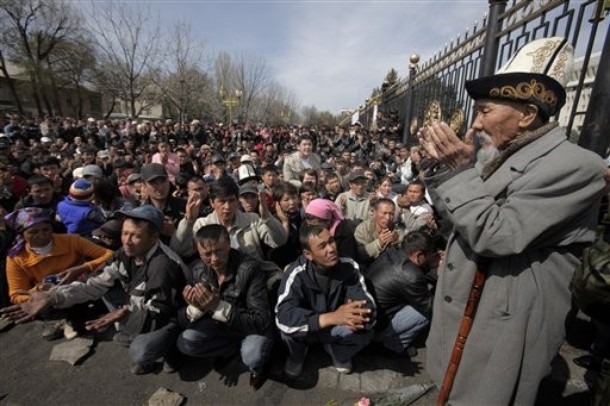Kyrgyzstan a model for the Middle East?

Golnaz Esfandiari notes that many Iranians are pondering the recent uprising in Kyrgyzstan, which saw the ancien regime run out of power in a mere two days. They're frustrated, she writes, by the Green Movement's lack of speedy progress.
Meanwhile, Sultan Sooud Al Qassemi examines why such uprisings don't occur against Arab autocracies:
The reason why Arabs are not more vocal about change in their countries varies from state to state. In the wealthy countries of the Gulf a sense of apathy can be felt that may be associated with materialism....
On the other hand are states that have largely been affected by former Egyptian leader Gamal Abdel Nasser's policies from financing coups to encouraging dissent including Egypt, Yemen, Syria, Libya, Tunisia, Algeria and until recently Iraq. In all cases corrupt leaders were replaced by equally corrupt leaders, so Arabs were back at square one.
In these less-wealthy states the opposition movements have floundered and have proven that they are either unable or unwilling to first and foremost instill good governance in themselves before they attempt to govern a state. The opposition movements' leaders have in most cases served in their positions for decades, appointed relatives to high ranks within the movement or demonstrated unrealistic expectations with regard to dealing with others â?? whether within the country or internationally â?? thereby leaving themselves largely without power or integrity.
On a ground level these states have perfected the notion of a police state. Rather unlike North Korea and China, they maintain the facade of democracy just enough to win praise or a blind eye from western leaders who are less inclined to host the opposition movements than they are the Dalai Lama, for instance.
Finally, Joseph Huff-Hannon finds a lesson for the United States:
But the unexpected swiftness with which an unpopular regime was swept aside, and the potentially seismic impact it has on the US war effort in Afghanistan â?? is a good reminder of the inevitable breaking point produced by a US foreign policy semantically dedicated to human rights â?? that looks the other way while "strategic allies" loot their countries' assets, murder their journalists, and send troops out to gun people down in the streets.In central Asia this groaning contradiction is louder than usual. While the war and occupation in Afghanistan was framed by President Obama recently as an effort at protecting "America's vital interests" in the region, there is at least periodic lip service paid to democracy enhancement and institution building in that country. But when democratic norms are trampled left and right in a neighbouring country, and the US looks the other way because it happens to be sitting on some prime real estate, we shouldn't be too surprised when things blow up and "strategic allies" fall before a storm of popular outrage.
While we shouldn't be surprised this happens, I'm still not convinced there's much we can do about it, at least in this specific instance. The Manas air base serves what appears to be a very important logistical function for operations in Afghanistan. Obviously, the U.S. military could work around the loss of the base, but it's not like Afghanistan's surrounded by liberal democracies dying to lend a hand - and given Afghanistan's land-locked position, such facilities are important.
I think this does underscore the necessity of dialing back the self-righteous rhetoric about freedom and democracy promotion that so often lures American politicians to heights of verbal excess. It's impossible to design foreign policy free of all contradictions and hypocrisy. But it is possible, one would hope, for our leaders to bit more mindful of highlighting those contradictions.
(AP Photo)











